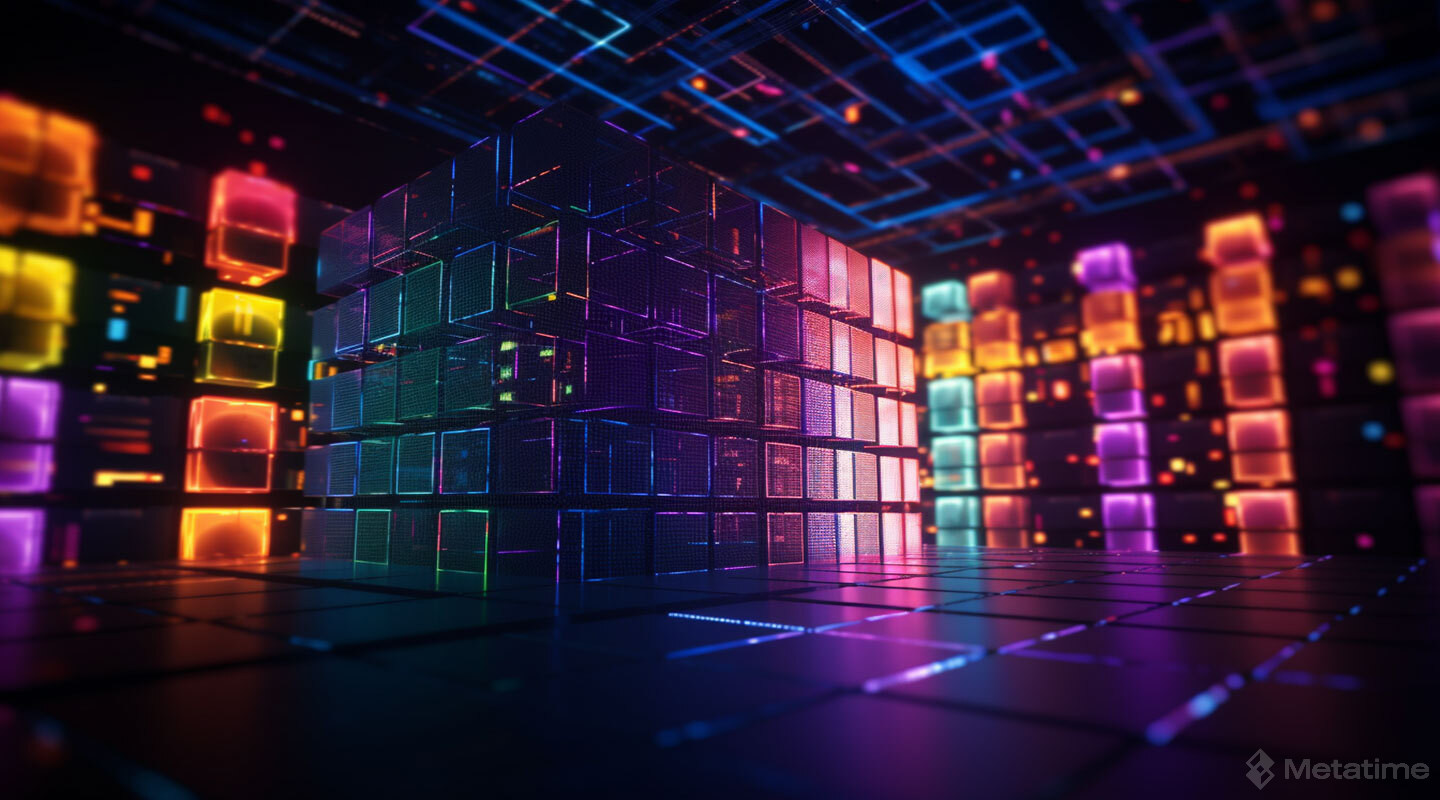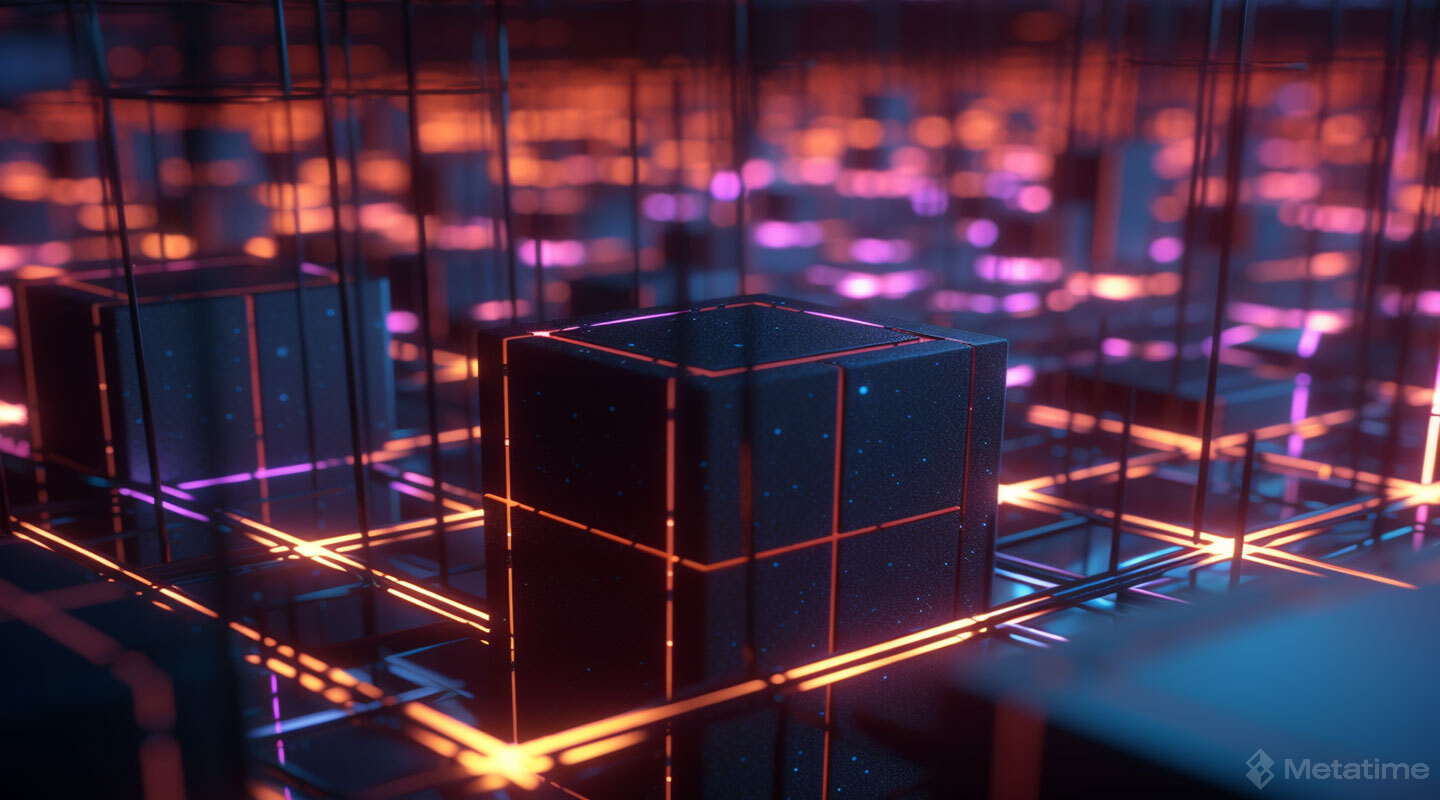Blockchain is a distributed database that resides between computer network nodes. Based on a decentralized and distributed network of users to verify and record transactions on the network, blockchain stores data digitally.
Blockchain provides transaction security and decentralization in cryptocurrency systems. Blockchain guarantees the accuracy and security of data and eliminates the need for third parties or organizations.
Different information can be stored on the blockchain and Distributed Ledger Technology (DLT) is used to record transactions. Blockchain stores data on blocks and these blocks have a certain storage capacity. Blocks that run out of capacity are closed and added to the previous block, creating a chain of data. Each block contains a copy of the previous block's information. Blocks added to the chain are a copy of the previous block and any block added to the chain is immutable.
In general, a blockchain is a distributed database. Blockchain stores information in blocks that are linked together by cryptography. As data is added, new blocks are created. When a block reaches its capacity, it is added to the previous block, which allows data to be chained together.
How Does Blockchain Work?
Every transaction provided in Blockchain is encrypted through cryptography and the transactions are recorded on blocks. When a block fills its capacity, a new block is created and chained to the previous block. Each block contains the code from the previous block.
The process is repeated and a chain is created between blocks. When the blocks are complete, a hash code is created and the next block references this hash code to create a new block. Thanks to the hash, a duplicate block cannot be created.
Transfers between wallets are processed on the blockchain. A Transaction ID code is created for information such as the wallet address of the sender and receiver, the amount sent or received.

What Are the Advantages of Blockchain?
Sustainable: Blockchain networks operate continuously on a global scale and transactions can be made at any time.
Speed: There is no need for third institutions or organizations to provide transactions, transactions are peer-to-peer and therefore faster than a traditional banking system.
Security: The distributed network of nodes that form the infrastructure of the blockchain provides security for situations such as attacks and interruptions passes.
Cost: Blockchains enable transactions at low costs.
Durability: Data on the blockchain is available to all users and is virtually impossible to change. Transactions provided on the blockchain are visible to everyone.
What Are the Disadvantages of Blockchain?
Blockchain allows for low-cost transactions, but it is almost impossible to be completely free. The Proof of Work (PoW) mechanism that a Bitcoin blockchain uses to verify transactions consumes a large amount of power. Despite Bitcoin mining fees, people continue to mine, which increases the cost.
Speed and Data Inefficiency
The process of adding a new block to the Bitcoin blockchain is completed in approximately 10 minutes thanks to the Proof of Work (PoW) mechanism in the Bitcoin blockchain. The blockchain network can manage seven transactions per second (TPS). Solutions to this problem have been developed for a long time. There are currently more than 30,000 blockchains with TPS. Each block can store a lot of data. Block size has been one of the most critical issues for the scalability of blockchains.
Illegal Activity
The privacy in blockchain is intended to protect users, but it also allows for illegal activities to take place on the network. Many transactions, such as the illegal buying and selling of goods, can take place on a blockchain network.
What Is the Blockchain Trilemma?
Blockchains focus on certain areas within the so-called trilemma triangle. These areas are speed, scalability and security. The vertices of the trilemma represent these areas.
This has caused some problems and shortcomings in the blockchain network, leading to the need for other structures that are integrated into the networks. As a result, solutions such as Layer-2, Side-chain and zkRollup are needed.
Blockchains that face trilemma issues can cause weaknesses with other developers' Layer-2 solutions, and users may experience time loss or financial loss as a result. Blockchains with existing consensus structures have high transaction fees and insufficient transaction speed.

What Is Blockchain Security?
Blockchain security is critical to the network and in order to increase network throughput on the blockchain, it is planned to reduce the distribution of blockchain nodes, but this is centralized and reduces the security in Proof of Work networks. With a limited distribution of nodes, the 51% attack is more likely to be executed as cyber attackers can obtain hash power in a simpler way.
What Is a Blockchain Wallet?
Blockchain wallets are the hardware that holds the keys that enable access to cryptocurrency. Cryptocurrencies are encrypted on the blockchain using cryptography. Blockchain wallets are used to access and manage cryptocurrency.
How Does a Blockchain Wallet Work?
Blockchain wallets do not store cryptocurrency in one place. When a cryptocurrency is acquired, ownership is also acquired. Cryptocurrencies are stored on the blockchain where they are generated. Private and public keys are used to access cryptocurrency. Private keys allow you to access the cryptocurrency and make transactions. To transfer a cryptocurrency to a different wallet address, you need to know the recipient's public key.
What Is Consortium Blockchain?
Consortium blockchains are blockchains created by companies that want to exchange information when they find blockchains insufficient for some reason. Consortium refers to situations where a single organization cannot do a job, but can be done jointly.
Consortium blockchains benefit from a certain degree of decentralization compared to private blockchains, as all groups of companies in the network are independent and cooperate equally.
What Are the Uses of Blockchain?
Although Blockchain technology is generally used in cryptocurrency, it is used for different purposes in many areas. The usage areas of Blockchain can be listed as follows:
- Payment processing and money transfer
- Monitoring supply chains
- Retail loyalty reward programs
- Digital identities
- Data sharing
- Copyright and user protection
- Digital voting
- Real estate, land and automobile title deed transfers
- Food security
- Immutable data backup
- Tax regulation and compliance
- Workers' rights
- Medical record keeping
- Weapon tracking
- Wills or inheritances
- Stock trading
- Managing business on internet networks
- Accelerating the trading and compliance of energy futures
- Secure access to items
- Monitoring of prescription medicines
- Banking and finance sector
- Internet of things
- Gaming industry
- Health sector
- Logistics sector
- State institutions
- E-commerce market
- Transportation sector

Payment Transaction and Money Transfer
Blockchain is used for fast transfers of assets. With blockchain, transactions can be made and verified 24/7.
Monitoring Supply Chains
With blockchain technology, the shortcomings of supply chains can be identified quickly and simultaneously. Blockchain allows operators and consumers to see the performance of products from the source to the retailer, measured in terms of quality control.
Retail Loyalty Reward Programs
Blockchain can be used for loyalty reward programs. A token-based system can be created and stored on the blockchain.
Digital Identities
Blockchain allows digital identities to be hosted in a decentralized and digital form.
Data Sharing
Blockchain enables the management of data within a decentralized network.
Copyright and User Protection
Blockchain ensures that copyright laws are fair.
Digital Voting
With the use of blockchain in digital voting, the possibility of fraud can be eliminated and a transparent, secure and decentralized voting structure can be created.
Real Estate, Land and Automobile Title Deed Transfers
Blockchain can be used in real estate, land and automobile transactions. Blockchain allows for faster title deed transactions, minimizing costs and increasing security.
Food Security
With blockchain, food products are traceable from the very first stage. Blockchain can be used to trace the origin of food products and ensure their safety.
Immutable Data Backup
Blockchain is a technology that can be used to back up data.
Tax Regulation and Compliance
Blockchain can be used in tax regulation or compliance. Blockchain technology can be used in transactions such as the accuracy of tax information, minimizing tax evasion or tax payments.
Labor Rights
Blockchain can be used to strengthen the rights of workers around the world. It can be used for record keeping for employee pay, time and benefits.
Medical Record Keeping
Blockchain can be used in medical record keeping to securely store and share patient information.
Weapon Tracking
Thanks to blockchain technology, governments can track firearms in an immutable and transparent way.
Wills or Inheritances
Instead of a physical will, it can be created and stored digitally on the blockchain network, or inheritance distribution can be based on specific criteria.
Stock Trading
Blockchain can be used to improve the efficiency, security and transparency of stock trading, eliminating long waiting times.
Managing Business on Internet Networks
Blockchain can be used to improve the management of devices or services connected to the internet.

Accelerating the Trading and Compliance of Energy Futures
Blockchain can be used to improve speed, compliance and transparency in the energy space.
Secure Access to Items
The smart contracts used in blockchain can be customized. With blockchain, any vehicle, building or equipment can be secured.
Monitoring of Prescription Medicines
Blockchain enables transparent tracking and oversight of prescription drugs.
Banking and Finance Sector
Blockchain technology can save time and money in banking and finance. With blockchain, third parties can be eliminated. This minimizes transfer fees and saves time.
Internet of Things
Thanks to the Internet of Things (IoT), blockchain makes it possible to exchange data with different objects and also allows them to be integrated.
Gaming Industry
Blockchain can be used in decentralized payment methods for crypto-based games.
Health Sector
Patient information can be stored on the blockchain and accessed digitally from anywhere in the world.
Logistics Sector
Blockchain can be used in logistics to track the movement of goods or maintain the flow of supply and can play an important role in the development of this sector.
Government Agencies
Blockchain technology allows national or local governments to host all citizens' records such as birth and death dates, marital status or property transfers, in a secure and organized manner.
E-Commerce Market
Blockchain can revolutionize the e-commerce industry with its security, transparency and decentralization. People can observe the product in question from the beginning to the end of the supply chain. People who own the product can check its authenticity thanks to the data stored in the blockchain.
Transportation Sector
Blockchain can be put to work in the transportation sector by increasing efficiency, reducing costs and being more transparent. Blockchain can be utilized in areas such as airline or car rental companies finding lost items and location data.
What Is MetaChain?
Blockchain is supported by nodes, which are important parts of decentralization, and MetaChain's hybrid mining mechanism. This feature of the MetaChain network allows for rapid decentralization.
MetaChain operates with 19 MetaMiner nodes in different locations on 3 continents around the world. The fixed master nodes offered by Metatime continue to run smoothly and their number can reach up to hundreds of thousands.
Not just a blockchain enhancement, Metatime provides enhancements to improve blockchain performance, minimize network latency and overcome the limitations of TCP (Transaction Control Protocol) protocols. With advanced technologies, MetaMiner nodes have reduced the integration process to less than 100 milliseconds.







